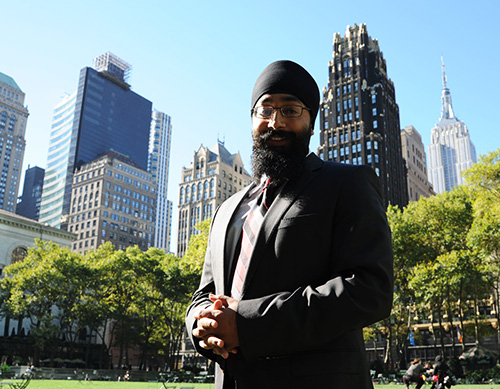
In a relatively short amount of time, Hansdeep Singh has become an important force fighting discrimination and preventing violence against vulnerable communities around the world. As a Sikh, Singh and his family have experienced discrimination first-hand. His parents left Iran and India to escape persecution, bringing the family to Southern California. After earning his J.D. at California Western and an LL.M. in International Law & Justice at Fordham, where he was first in his class, Singh served as Senior Staff Attorney at UNITED SIKHS before earlier this year co-founding the International Center for Advocates Against Discrimination (ICAAD). Singh and his wife, Tejal Kaur, a child psychiatrist, live in New York City with their 15-month-old daughter.
 |
|
Hansdeep Singh '08
|
Res Ipsa: You were pre-med at USC. How did you end up as a lawyer instead of a physician?
Singh: All through my life I've made choices that have led me down a path to advocating for social justice. In college, 9/11 sent me in a new direction... it completely altered my perception of what it meant to be a Sikh in this society. I'd always felt American, but then I saw Sikhs being pulled off trains because people saw their beards and turbans and thought they were terrorists. In a post-9/11 period where fear and xenophobia were at its height, Sikhs had become collateral damage. I chose law because I thought it offered a way for me to effect change, to get society to recognize the common humanity between people and that there is nothing to fear from those who are different.
Res Ipsa: What role did California Western play?
Singh: It was critical in so many ways. I went there because I had heard it had a strong International Law program, and in fact I gained a tremendous amount of knowledge and tools that have been invaluable. Just as important was the incredible support and advice I received from Career Advisor Jill Blatchley, Professor Noyes, and particularly Associate Dean Aceves, who was an amazing mentor. I was his research assistant for two years and he assigned me research topics ranging from rendition to claims filed under the Alien Tort Statute, which helped foster my passion for international law. Finally, another fortuitous thing happened. Through the school’s participation in the Judicial Clerkship Program, I got internships at the International Criminal Tribunals of Rwanda and Yugoslavia located in Tanzania and The Hague, respectively. I had the absolutely exhilarating experience of witnessing how the first Criminal Tribunals since Nuremburg were able to hold accountable those who carried out mass atrocities against humanity.
Res Ipsa: What led you to create the International Center for Advocates Against Discrimination (ICAAD)?
Singh: After working for UNITED SIKHS and learning so much about how to protect and advocate for Sikhs, a colleague and I realized that a lot of other minority and vulnerable communities face similar civil and human rights violations, whether it’s profiling, religious persecution, torture, hate crimes, violence against women, or bullying of children. Specifically, we’re committed to addressing a major gap in the law, which is the absence of any kind of model that focuses on prevention of violence against disfavored groups.. Because governments have mostly failed in protecting the vulnerable, we decided that attacking structural discrimination is the key because we’ve seen that it forms the foundation, over time, for persecution and violence against these communities, and at its extreme, genocide.
Res Ipsa: What has been the reaction to your new organization?
Singh: We’ve been amazed by what we’ve accomplished in just our first nine months. There are only two of us, and our budget is just $150,000, but we’ve already seen that our model for creating partnerships with law firms, law school clinics, and NGOs is working. We've already prevailed in three cases. Our first case - against the Transportation Security Administration (TSA) - gained the right for TSA employees to wear their articles of faith without any constraints. We've established partnerships with four major law firms that have already provided over $200,000 in pro bono services. And we are currently solidifying partnerships with major international law legal clinics. We believe ICAAD is unique because we’re combining a number of different strategies into a single model, including high impact litigation, leveraged partnerships, advocacy, coalition building, and international law.
Res Ipsa: Was the terrible attack this past summer on the Sikh temple in Wisconsin a deadly manifestation of what you're fighting?
Singh: Absolutely. As a Sikh, I was personally numb and didn’t even know how to react at first. Then I felt anger... realizing that incidents like this are part of a broader climate of hate that exists in our culture today. It was a brutal reminder of how much work still needs to be done. Ultimately, I had to step back to see the bigger picture, that while this happened to be a tragic event that impacted Sikhs, but that many vulnerable communities, whether Latino, Muslim, Jewish, LGBT, Black, all continue to be impacted by hate crimes. Currently, we are working to address the FBI's failure to accurately code and document hate crimes nationally.
Res Ipsa: How do you stay positive when things like this happen?
Singh: They actually motivate me to do more. I'm the ultimate idealist, because while there are huge challenges in what we're trying to achieve, I really believe that if we work hard enough, with as much passion as we can bring to bear on each issue, we have a real opportunity to tear down the structures that lead to violence against specific groups. The potential for that kind of significant change - on a global level - is why I truly love what I'm doing.
BOB ROSS // RES IPSA ONLINE